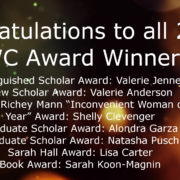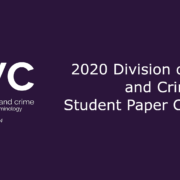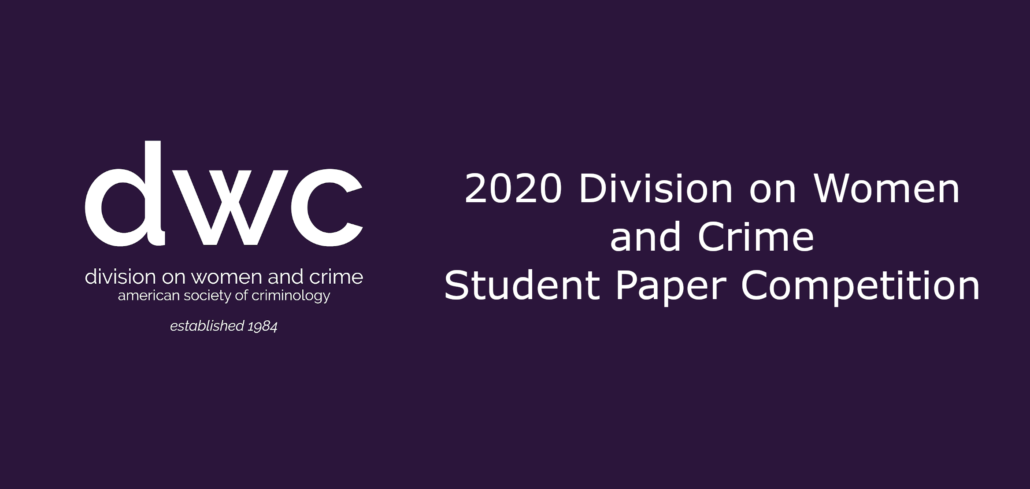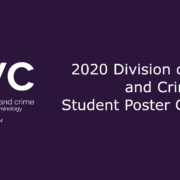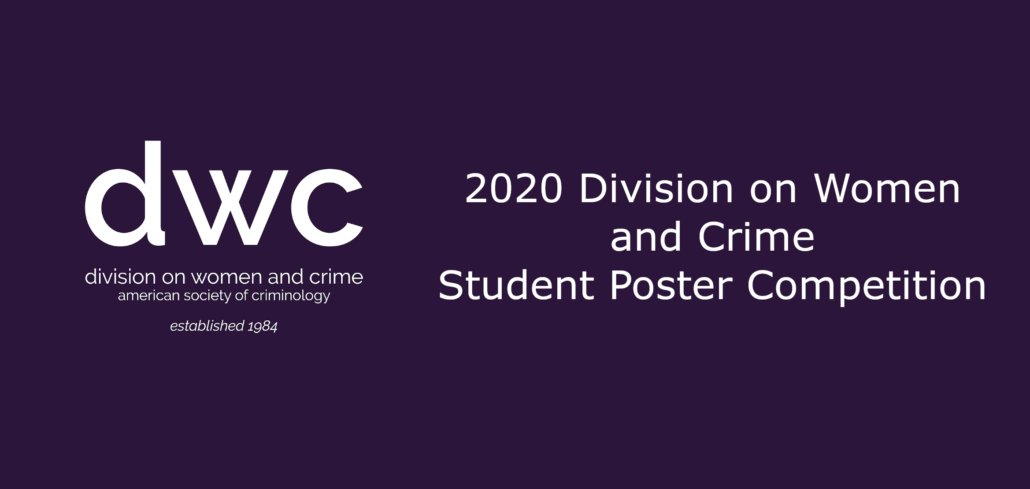DWC 2020 Internal Award Winners
Distinguished Scholar Award: Valerie Jenness
The Distinguished Scholar Award is intended to recognize outstanding contributions to the field of women and crime by an established scholar. Dr. Valerie Jenness has earned this honor through the accumulation of contributions in research and public intellectual work over the past twenty-nine years. She earned her Ph.D. in Sociology from UC Santa Barbara in 1991. Since that time, she has co-authored or edited five books, more than fifty journal articles and book chapters, and nearly twenty reports. Dr. Jenness has received numerous research grants and has engaged in more than sixty community presentations and press interviews. She has received awards recognizing her teaching, service to practice, and scholarship. Dr. Jenness currently serves as Acting Vice Provost for Academic Planning and Institutional Research and is a Distinguished Professor in Criminology, Law and Society at the University of California Irvine, holding courtesy appointments in the Department of Sociology and the School of Nursing.
Dr. Jenness’ nomination did not focus on her (impressive) record from a quantitative standpoint, but rather highlighted the meaningful impact of her works in the realms of academia, policy, and practice. For the past decade her work has focused on transgender women incarcerated in prisons for men. Her nominator describes how her original research in this vein has made visible an invisible population, has utilized mixed methods in creative and effective ways, demonstrates sensitivity to the lives of marginalized women, and serves as a basis to engage in policymaking and public service. In his words, “Professor Jenness is a member of the DWC and a pioneer—in the truest sense of the word—in the study of women and crime as well as a prodigious scholar who has brought her sociological training to bear on the study of violence against women as well as purposeful social action and policy reform that has made our world a better place, especially for transgender women in prisons and other types of lock-up facilities […] Professor Jenness is easily recognized as an academic leader as well as a leader in the larger pursuit of fair, equitable, human, and constitutional treatment of transgender women behind bars.”
New Scholar Award: Valerie Anderson
The New Scholar Award recognizes the achievements of scholars who show outstanding merit at the beginning of their careers, through either a singular work or a series of contributions on women and crime. Dr. Valerie Anderson received her doctorate from Michigan State University in 2015, spent one year as a postdoctoral fellow, and has been on faculty at the School of Criminal Justice at the University of Cincinnati since 2016. In that time, she has co-authored twenty-two peer-reviewed publications, eight book chapters, two technical reports, and has a book project under contract. She has served as PI, Co-PI, or Action Researcher on eight funded projects focused on human trafficking and juvenile justice. Dr. Anderson’s nomination emphasized her merit in the capacities of student mentorship and research. She has leveraged her active research agenda to provide student research experience and training that students have taken note of: “prospective students have already noticed her commitment to high impact scholarship and mentorship, and doctoral student applicants frequently list Dr. Anderson as the faculty mentor with whom they are most interested in working.” Her nomination also highlighted her contributions to research on girls in the juvenile justice system, intersectional issues in race and gender in the juvenile justice system, and her involvement in state-funded research on human trafficking with implications for local policy. Dr. Anderson’s nominators emphasized that her work on female delinquency and victimization “exemplify the Division’s emphasis on impactful scholarship, commitment to women and crime as a research discipline, and advocacy for evidence-based gender-responsive policy and practice”.
CoraMae Richey Mann “Inconvenient Woman of the Year” Award: Shelly Clevenger
The CoraMae Richey Mann “Inconvenient Woman of the Year” Award recognizes a scholar/activist who has participated in publicly promoting the ideals of gender equality and women’s rights throughout society. Dr. Shelly Clevenger earned her PhD in Criminology in 2012 from Indiana University of Pennsylvania. Since then she was a faculty member in the Criminal Justice Sciences Department at Illinois State University until just recently when she began as Associate Professor and Chair of the Victim Studies Department at Sam Houston State University. Throughout her career, Dr. Clevenger has successfully merged scholarship, activism, and pedagogy in the areas of gender equality, intimate partner abuse, and sexual violence. According to her nominator, the well-documented failure to assist primary and secondary survivors of abuse is “what motivates Dr. Clevenger to be an ‘inconvenient woman’ year after year in the bringing of these crucial issues to life within the classroom”. Some examples of Dr. Clevenger’s exemplary work in this area include: students work with survivors of intimate partner abuse to create artwork that expresses their experiences and views, the product of which is kept by the student or sold at an event to benefit a local victim service agency; informational brochures about abuse are created by students and shared at community events and with the local police department; based on quotes provided by sexual assault survivors, students create clothing to model what the survivor was wearing in an effort to challenge sexual assault myths. In addition to Dr. Clevenger’s work in the classroom and local community, she has also advocated for social change and increased attention to gender-based violence through her powerful testimony to the United States’ Congress and the United Nations. Her innovative and impactful research, which focuses on secondary survivors of crime and cyberharrassment, further evidences her commitment to gender equality, women’s rights, and gender and crime.
Graduate Scholar Award: Alondra Garza
The Graduate Scholar Award recognizes the outstanding contributions of graduate students to the field of women and crime, both in their published work and their service to the Division on Women and Crime. This year, Alondra Garza is one of two recipients of this award. Ms. Garza is entering her third year of the PhD program in the Department of Criminal Justice and Criminology at Sam Houston State University. She is a doctoral research assistant with the Crime Victims’ Institute at SHSU with research interests in victimology, gender and crime, violence against women, justice system responses to victimization, intersectionality and victimization, decision making, and mixed methods research. Ms. Garza already holds an impressive research record: she is co-author on five peer-reviewed publications (two as first author), and nine technical and translational research reports (three as first author). She is active in service to her department, university, and the discipline. Ms. Garza has served on the DWC’s Diversity and Inclusion Committee for two terms as well as volunteering for the outreach table. She is an active member in the ASC, ACJS, the Texas Victim Service Association, and the Latina Researchers Network. In the words of her nominator, “Not only is Alondra’s program of research thus far relevant, timely, and impressive, but her service endeavors have reflected her commitment to discipline-level citizenship and the importance she places on the field of women and crime.”
Graduate Scholar Award: Natasha Pusch
The Graduate Scholar Award recognizes the outstanding contributions of graduate students to the field of women and crime, both in their published work and their service to the Division on Women and Crime. This year, Natasha Pusch is one of two recipients of this award. The (now) Dr. Pusch graduated in May from Arizona State University with research interests in corrections, gender and crime, juvenile justice, and victimization. She is beginning her first faculty position as Assistant Professor in the Department of Sociology, Anthropology, and Social Work at Texas Tech University this fall. Her research record includes two sole author peer-reviewed journal articles, two first co-author peer-reviewed
articles, and co-authorship on a forthcoming book chapter. In terms of service, her nominator highlighted that Dr. Pusch has consistently brought fellow students to DWC events facilitating introductions with scholars in the field and, perhaps most notably, has served as Managing Editor for Feminist Criminology since 2018. In this capacity she has had numerous responsibilities related to reviewing submissions, communicating with the editorial board and production team, and handling social media for the journal. Her nominator spoke to Dr. Pusch’s “commitment to women and crime as a research focus, her dedicated service to the DWC as Managing Editor of Feminist Criminology, and to her mentoring of undergraduate and graduate students,” arguing convincingly that “Natasha’s contributions to research, teaching, service, and other activities make her especially well-deserving of this award.”
Sarah Hall Award: Lisa Carter
The Sarah Hall Award recognizes outstanding service contributions to the DWC and to professional interests regarding feminist criminology and women and crime. Dr. Lisa Carter earned her PhD in Criminology in 2012 from Indiana University of Pennsylvania. Since then she has been an active faculty member at Florida Southern College where she is currently Associate Professor of Criminology and Department Chair. Dr. Carter’s devotion to service is evidenced through her on-going work with organizations such as the Pace Center for Girls, Lakeland Women’s Collective, State of Women in Polk County, Strong Black Women in Leadership, Red Tent Initiative, League of Women Voters – Polk County, and Heather’s Hope. She expertly weaves service and pedagogy by incorporating her students and others into many of these service activities. Dr. Carter also serves in a variety of capacities for ACJS and ASC, including work for the DWC Mentoring Committee, Teaching Committee, and Teacher Trainer Workshop. Her devotion to service is clear, embodying the spirit of this award. As her nominator states, “In 15 years of knowing her, she has worked tirelessly to fight for those that cannot fight for themselves and to impact change. Her service work ethic is one that I admire. She inspires me in my own professional and personal life to work harder and do more.”
Book Award: Sarah Koon-Magnin
The Book Award is given annually for a book, published within three calendar years preceding the year in which the award is made, that makes the most outstanding contribution to feminist criminology. Dr. Sarah Koon-Magnin earned her PhD in Crime, Law, and Justice from Pennsylvania State University in 2011. Since then she has been a faculty member at the University of South Alabama where she is currently Associate Professor in the Department of Political Science & Criminal Justice. In 2019, Drs. Corina Schulze, Sarah Koon-Magnin, and Valerie Bryan published their book “Gender Identity, Sexual Orientation, and Sexual Assault: Challenging the Myths” with Lynne Rienner Publishers. The main thesis of the book is that the perception and experience of sexual assault among sexual minority communities, where the risk of sexual victimization is disproportionately high, is crucial to understanding and addressing sexual assault in all communities. Drawing from Queer criminology, the book focuses on qualitative data gathered from a sample of sexual minorities to illustrate the influence of sexual orientation and gender identity on the experiences of sexual assault survivors, including their treatment by the criminal justice system. The book has already received positive reviews on the publisher’s website, International Review of Victimology, and Gender and Society. One reviewer stated that this book is, “The first work I’ve come across that not only deals with gender and sexual identity but introduces new means to examine sexual assault in inclusive ways. An enormous contribution to our work to understand and assist queer-identified survivors of sexual assault”.

